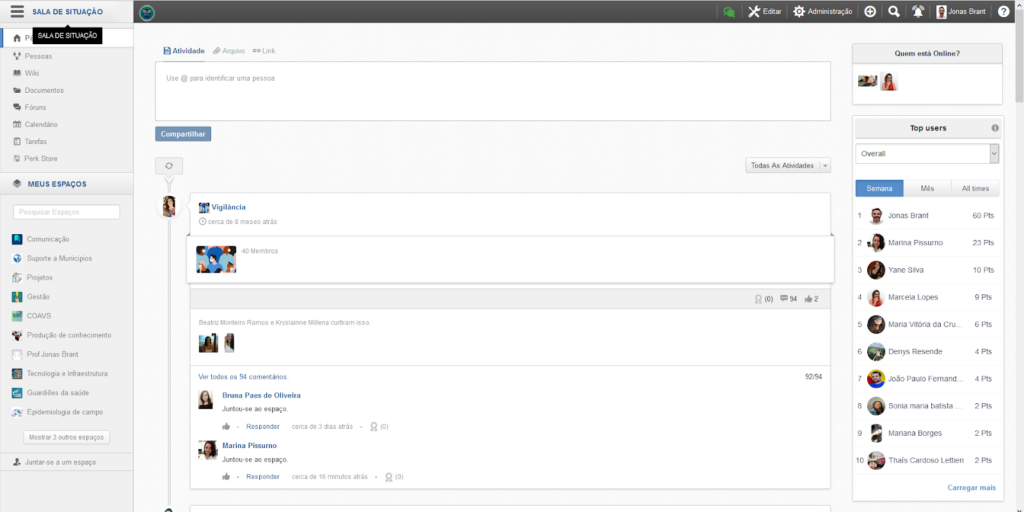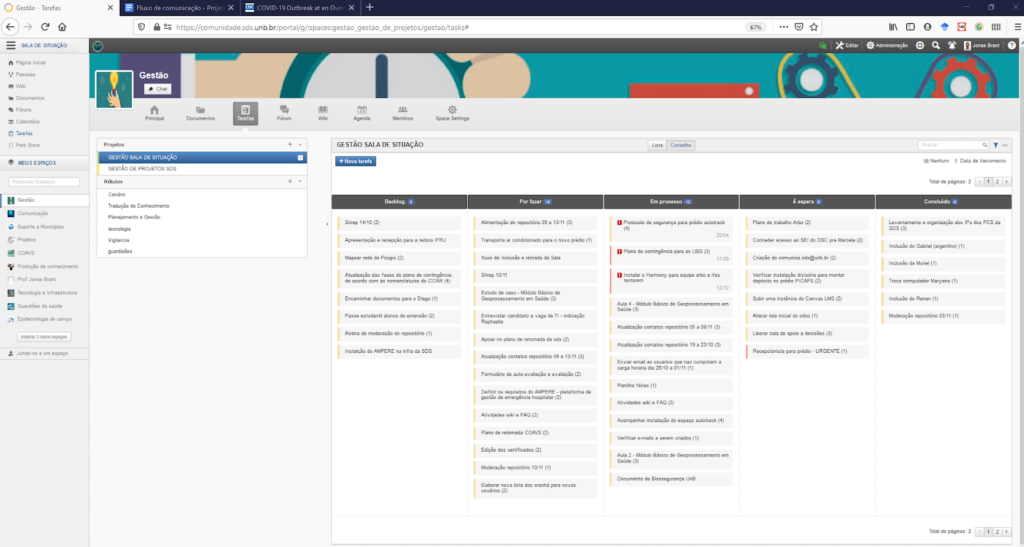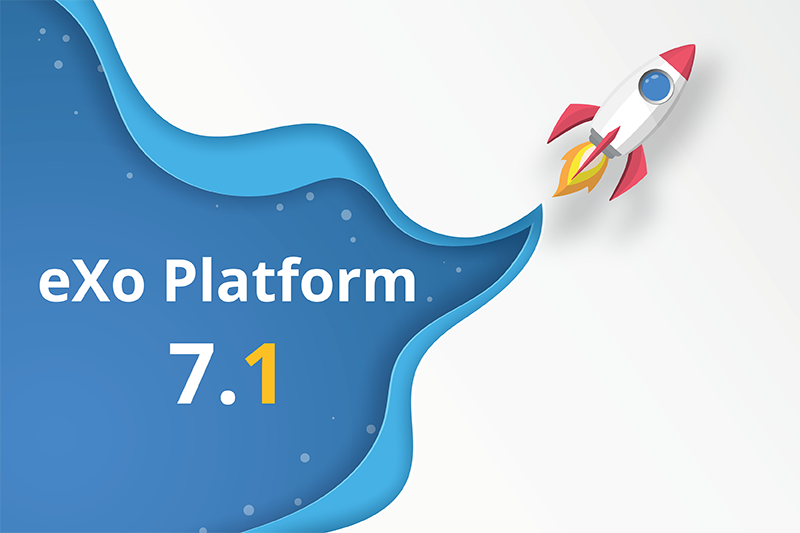- Fares Laroui
- January 13, 2021
How ProEpi and the UNB Situation Room use eXo Platform to respond to the COVID-19 pandemic
Interview with Jonas Brant, professor and coordinator of the Health Situation Room at the University of Brasilia. He is also a World Health Organization consultant for public health emergency response capacity and is a voluntary member of the Board of Directors of the Brazilian Association of Field Epidemiology Professionals.
ProEpi and the UNB situation room partner with eXo Platform to lead the response against COVID-19 as part of the eXo Grants Program. Through this programme, eXo is committed to provide a free license for nonprofits and NGOs who are willing to use eXo Platform for a good cause.

Content
Tell us more about the project stakeholders and objectives
ProEpi is the Brazilian Association of Field Epidemiology. It is a civil, non-profit organisation founded in 2014 and headquartered in Brasilia, Brazil.
The association is dedicated to the training and growth of health professionals with the objective of strengthening promotion, prevention and public health surveillance in Latin America and Portuguese-speaking Africa. The association has a robust network of professionals focused on health surveillance with more than 200 senior associate members across the region and is fully engaged in the COVID-19 response.
In addition, ProEpi aims to structure contributions to improve the national and international health surveillance strategy. The main areas of activity are technologies and innovations for health surveillance, collection, management and analysis of public health data, communication of health risks and effective practices for outbreak investigation and emergency health management.
The Situation Room is a University of Brasilia laboratory (UNB) department located in Brasilia, Brazil, which aims to bring together students, teachers, collaborators and health professionals to support monitoring, analysis and guidance for decision makers of local public health units.
The Situation Room has groups involved in surveillance evaluation, data analysis and support for technology incorporation in several areas of public health and has more than 100 health professionals and students.
ProEpi and UNB Situation Room have partnered to respond to COVID-19 and strengthen the network of professionals engaged in the syndemic consequences of the pandemic.
How did you hear about eXo Platform?
We learnt about eXo Platform from the open source community and started to follow and pilot its implementation back in 2018.
Why did you choose eXo Platform?
We chose eXo Platform for digital project management work and its diverse features and functionalities. Among them we highlight the possibility of customisation, corporate artifacts, the channels of private or open interaction and the connection between employees, customers and partners in real time.
The potential of gamification is something that is not in use yet, but which we consider could make a big difference for community engagement.
What do you use/want to use eXo Platform for?
Currently, the UNB Situation Room is using eXo Platform (version 5.3.0) to manage and control: tasks, communication flow between teams, information exchange and collective construction of materials as well as the onboarding of up to 150 members.
In addition, we intend to incorporate eXo Platform in partnership with ProEpi as a unique management platform for students and health professionals spread across geographically distributed areas. The platform aims to facilitate management tasks and day-to-day operations, foster collaboration, and facilitate the exchange of experiences among other features.
How many people are using the platform?
Today we have around 150 active users on the platform. Considering the collaboration with ProEpi, we expect to achieve around 1000 active users by the end of 2021.
Tell us about your project development phase
Today eXo Platform is fully implemented in the routine of the UNB Situation Room. We expect that through the collaboration with ProEpi and its field epidemiology network, we will be able to integrate not just students and professionals, but the local field epidemiologists who are leading the syndemic response in different cities. We believe that by having a common platform, collaboration between different parties could make the difference in terms of coordination and lean development of methodologies to improve surveillance and, as a consequence, community health.
How did your project evolve over time?
At the beginning, and as is the case with any new project, there was some resistance to change from UNB staff, who preferred to use their own messaging apps to get in touch. However, as the team grew, keeping track of a variety of conversations and documents became increasingly challenging using those apps (which were not necessarily designed for such use). This is when the team realised that eXo Platform is a better alternative thanks mainly to the platform’s holistic approach and its capacity to enhance the overall working experience.
We see great potential in terms of the integration of multiple stakeholders, such as university staff and professionals in the field. Through eXo Platform, we expect the collaboration to be beneficial for both parties. On the one hand, students will be better informed and trained directly within the platform. On the other hand, professionals in the field will be able to easily access a rich knowledge base containing everything they need to get their work done.
Watch the testimonial
The platform was deployed based on the eXo Platform 5 Community Edition. The project team will soon deploy our latest version eXo Platform 6 On-premises.
 Stream page
Stream page

 Task manager
Task manager

eXo Platform 6 Free Datasheet
Download the eXo Platform 6 Datasheet and
discover all the features and benefits
discover all the features and benefits
- Tags: eXo
5/5 - (23 votes)
I am a product marketing specialist at eXo. My role is to assist marketing and sales teams in their operations and present our digital workplace solution to the world. I mainly blog about the latest tech trends, digital transformation, internal communication and how to navigate through eXo Platform.
Related posts
- All
- eXo
- Digital workplace
- Employee engagement
- Open source
- Future of work
- Internal communication
- Collaboration
- News
- intranet
- workplace
- Knowledge management
- Employee experience
- Employee productivity
- onboarding
- Employee recognition
- Change management
- Cartoon
- Digital transformation
- Infographic
- Remote work
- Industry trends
- Product News
- Thought leadership
- Tips & Tricks
- Tutorial
- Uncategorized
Leave a Reply
( Your e-mail address will not be published)
Connexion
0 Comments
Commentaires en ligne
Afficher tous les commentaires


